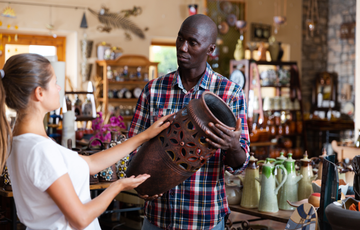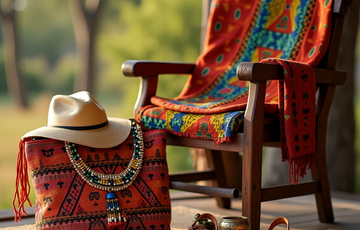African crafts are experiencing a surge in global popularity, driven by a renewed appreciation for cultural authenticity, unique designs, and ethical consumerism. For retailers looking to meet customer demands and stand out in the competitive market, stocking African crafts offers an opportunity to bring a piece of Africa's rich heritage into their stores. In this blog, we’ll explore the reasons behind the growing demand for African crafts in global retail and why resellers and brands should consider adding these products to their collections.
1. The Appeal of Authenticity and Cultural Heritage

Dinka women wearing red and yellow beaded corsets that show their marital status within the community. Dinka corsets are now very popular decor items.
Consumers today are increasingly seeking products that tell a story and connect them with different cultures. African crafts embody authenticity, cultural heritage, and traditional craftsmanship, offering customers a unique alternative to mass-produced goods. Here's why authenticity matters:
- Unique Craftsmanship: Each African craft is a reflection of the artisan's skill, cultural history, and the region's materials. From handwoven baskets to intricate beadwork, these products showcase a level of detail and artistry that is hard to replicate with machine-made items.
- Storytelling Through Art: Many African crafts are more than just functional or decorative items; they carry deep cultural meanings and traditions passed down through generations. For example, Maasai beadwork, Zulu baskets, or Ghanaian Kente cloth have unique cultural stories that resonate with consumers who value cultural diversity.
- Supporting Heritage Preservation: Stocking African crafts in retail outlets helps preserve traditional art forms and provides economic incentives for artisans to continue practicing their craft. By offering these products, retailers can contribute to the preservation of African cultural heritage.
2. The Rise of Ethical Consumerism and Sustainability
Ethical consumerism is a significant driver behind the growing demand for African crafts. Modern consumers prefer products that are sustainably sourced and contribute positively to communities.
- Eco-friendly Materials: Many African crafts are made using natural, recycled, or upcycled materials, such as sisal, raffia, cow horn, and recycled glass beads. These sustainable practices appeal to eco-conscious customers looking to reduce their environmental footprint.

Traditional mud cloth is dyed using fermented mud instead of synthetic chemicals which is safer for consumers and the environment.
- Fair Trade and Community Support: African crafts often come from artisan cooperatives that operate on fair-trade principles, ensuring fair wages and good working conditions. Retailers who stock these products can assure their customers that they are supporting ethical trade and social impact.
- Social Impact Storytelling: Brands can use the story behind each craft to communicate the positive impact their customers' purchases have on the lives of African artisans. This helps build a strong emotional connection between the product, the consumer, and the artisan community.
3. Increasing Popularity in Home Décor Trends

Malawi cane products which are very popular now for interior design projects.
African crafts have made their way into contemporary home décor, as interior design trends shift towards incorporating global influences, natural textures, and handmade items. Here’s why African crafts fit perfectly into this trend:
- Natural and Organic Aesthetics: Items like woven baskets, wooden sculptures, and hand-carved furniture are made from natural materials that complement the current preference for organic aesthetics in home décor. Their rustic charm and earthy tones bring warmth and character to any space.
- Accent Pieces with Cultural Depth: African crafts can serve as statement pieces or accents in a room, adding depth and a touch of the exotic to the overall design. Pieces like colorful mudcloth cushions, bold Shona stone sculptures, or intricately woven Zulu baskets can elevate the style of a living space.
- Versatile Use in Various Styles: Whether it’s a minimalist, bohemian, eclectic, or contemporary style, African crafts can seamlessly fit into different design themes, making them appealing to a wide range of customers.
4. The Growing Appeal of African Fashion and Accessories

African fashion and textile patterns are highly sought after by consumers.
The fashion world is increasingly embracing African-inspired designs, from traditional prints to handcrafted jewelry. For retailers, African crafts in fashion offer a unique opportunity to tap into a trend that celebrates diversity and cultural expression.
- Handmade Jewelry: African jewelry, such as beaded necklaces, brass bracelets, and leather accessories, are sought after for their unique designs and artisanal quality. They can appeal to fashion-conscious customers who value distinctive and handcrafted items.
- Textiles and Fabrics: African textiles like Kente, Ankara, and Shweshwe fabrics are used not only in clothing but also in accessories such as bags, scarves, and headwraps. Stocking these items allows retailers to offer vibrant, culturally rich products that attract customers looking for colorful and bold fashion choices.
- Collaborative Fashion Lines: Brands looking to create their next collection can partner with African artisans to co-create exclusive designs. This collaboration not only diversifies a brand's offering but also brings authenticity and ethical sourcing to their collections.
Opportunities for Resellers in Tourism and Airport Shops
For resellers who operate in tourist hubs, airport shops, or locations frequented by international visitors, African crafts can be a perfect product offering.
- Travel Souvenirs: African crafts make for ideal souvenirs because they are lightweight, culturally significant, and offer a sense of place. Items such as small woven baskets, beadwork, or miniature sculptures are easy for travelers to carry and are highly valued as meaningful mementos.
- Gift Items: African crafts also make for thoughtful gifts. Many tourists and business travelers seek unique gifts to take home for family, friends, or colleagues, and African crafts offer a range of options that cater to various tastes and preferences.
- Partnerships with Hotels and Resorts: Retailers can collaborate with hotels, lodges, or resorts that cater to international visitors to create customized African craft gift packages. This not only expands market reach but also adds a local touch to the guest experience.
Customization and Co-Creation: Partnering with Artisans
For brands looking to differentiate themselves, partnering with African artisans to create exclusive or co-branded products can be an attractive option.
- Custom Corporate Gifts: African crafts can be customized with a brand’s logo or color scheme, making them ideal for corporate gifts. This allows companies to offer gifts that are not only personalized but also culturally significant.
- Private Label Collections: Retailers can collaborate with artisans to produce exclusive lines that are not available elsewhere. This co-creation approach gives brands a competitive edge and a unique product offering.
- Seasonal and Limited-Edition Releases: By working with artisans to create seasonal or limited-edition collections, retailers can generate excitement and urgency around their African craft offerings, leading to increased sales and brand loyalty.
Why Retailers Should Stock African Crafts Now
With the rise in demand for ethically sourced, culturally significant, and handmade products, African crafts are becoming an essential offering for retailers who wish to appeal to conscious consumers.
- Differentiation in a Competitive Market: Stocking African crafts helps retailers differentiate themselves from competitors who primarily sell mass-produced items. These unique, handcrafted products stand out and offer added value.
- Growing Market Potential: The global market for African crafts is expected to continue growing as more consumers embrace ethical consumption and seek products with cultural stories. Retailers who enter this space now can establish themselves as pioneers in offering authentic African goods.
- Direct Impact on Artisans: By stocking African crafts, retailers directly contribute to improving the livelihoods of artisans, many of whom rely on their craft for income. This social impact resonates with customers who want to support brands that make a difference.
Conclusion
The demand for African crafts in global retail is on the rise, driven by consumer preferences for authenticity, cultural significance, and ethical sourcing. For resellers and brands, stocking African crafts not only meets market demand but also offers an opportunity to contribute to positive social impact while providing customers with unique and meaningful products. Whether you are a retail shop looking to diversify your inventory or a brand seeking to create an exclusive collection, African crafts offer versatility, style, and cultural richness that can enhance your product offerings.
At Mawu Africa, we connect retailers with a wide range of handcrafted African products that embody the beauty and diversity of the continent. Partner with us to bring a piece of Africa to your customers and make a lasting impact on artisan communities across the continent.





